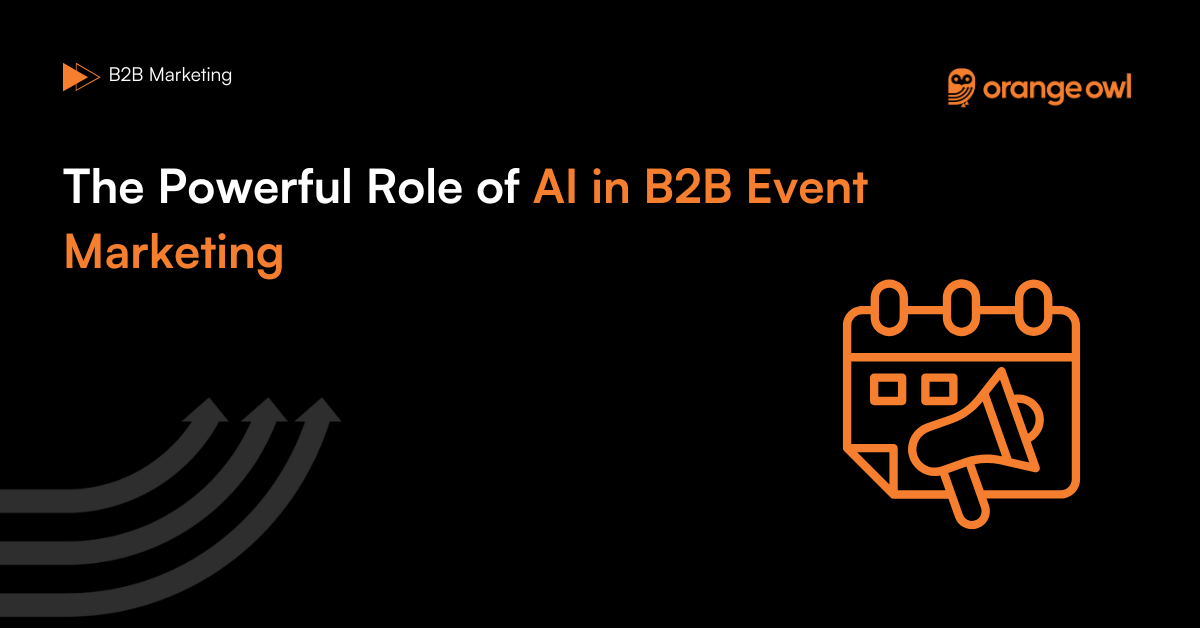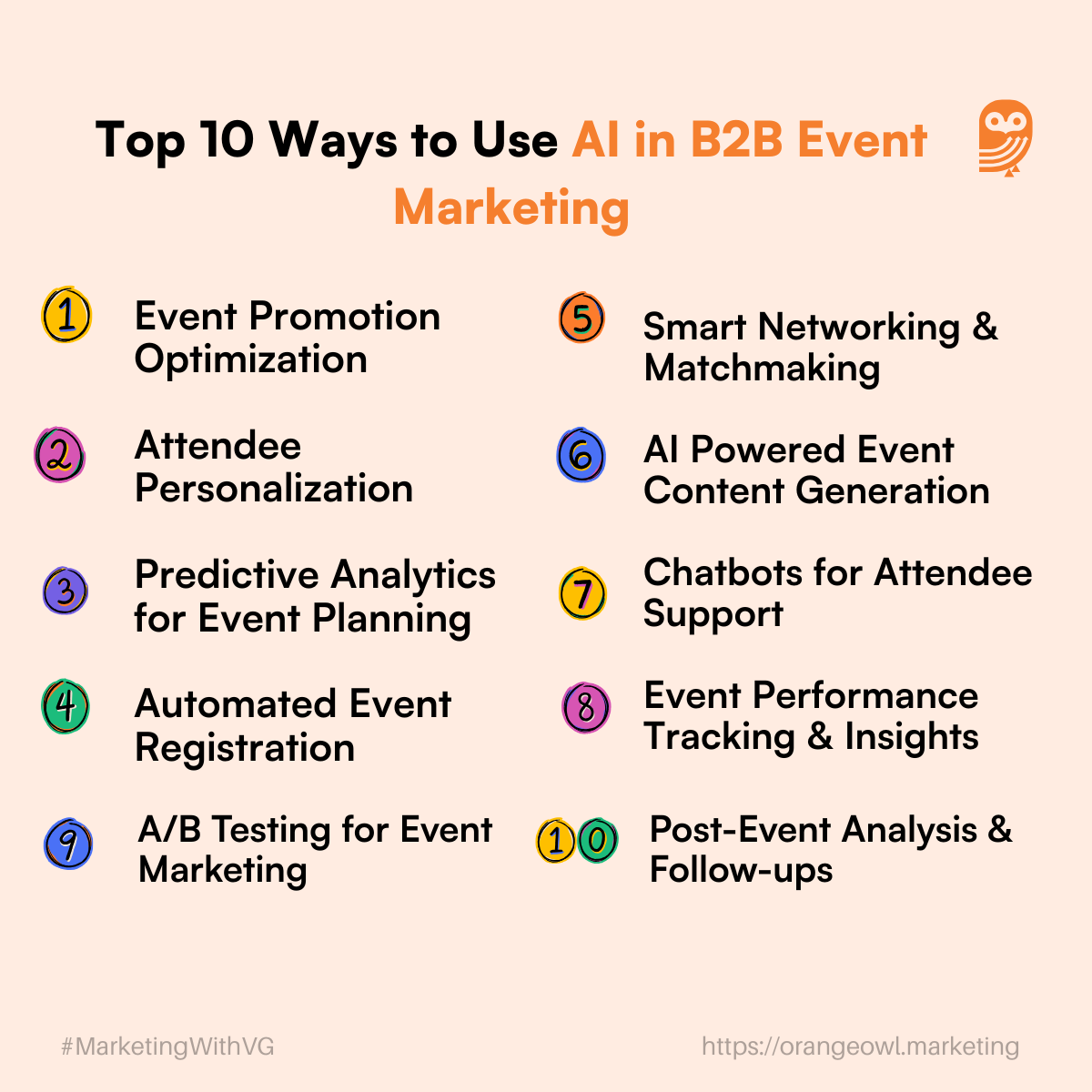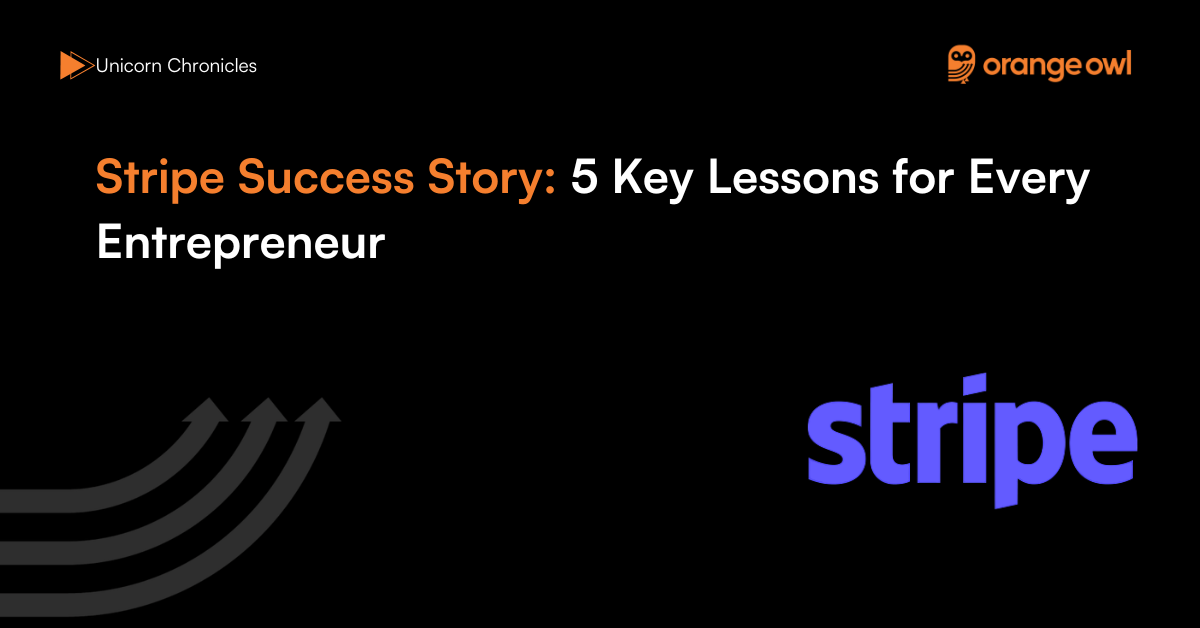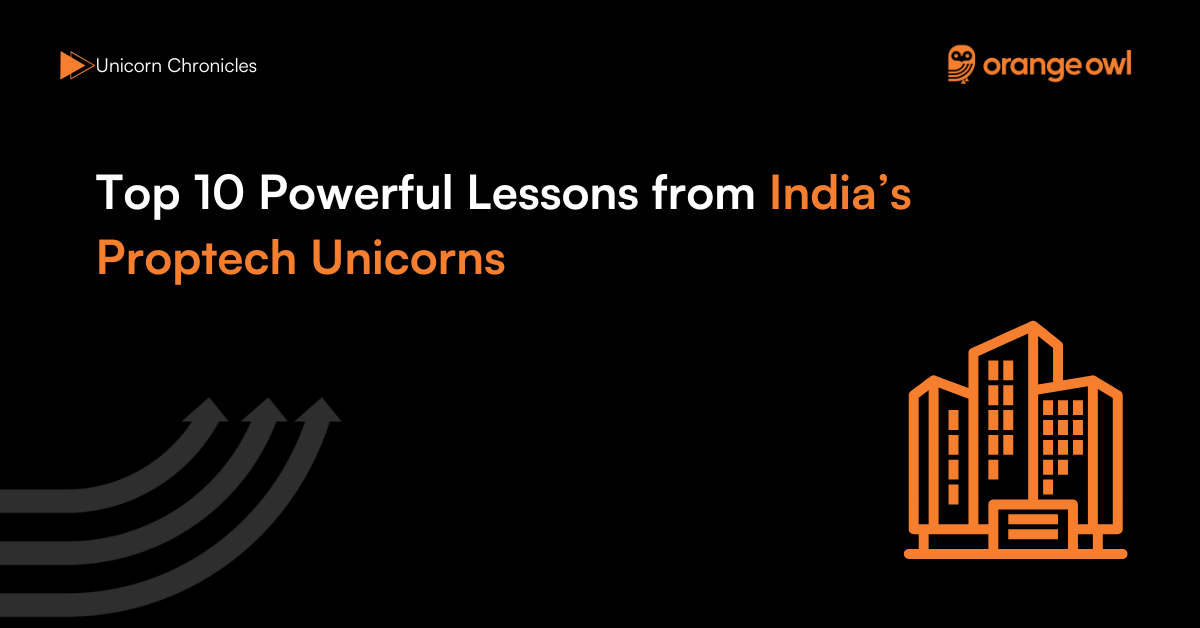The Powerful Role of AI in B2B Event Marketing
Vivek Goel
April 3, 2025

Table of Contents
Introduction
The Role of AI in B2B Event Marketing is becoming increasingly crucial as businesses look for innovative ways to enhance event experiences and drive better engagement. AI-powered tools are transforming the way events are planned, executed, and analyzed by automating repetitive tasks, optimizing outreach efforts, and ensuring a seamless experience for both organizers and attendees.
With the ability to analyze large datasets and predict attendee preferences, AI is reshaping how businesses approach event marketing, leading to higher efficiency and improved return on investment.
According to a recent survey, 68% of marketers are now leveraging AI to assist with day-to-day tasks such as event planning, audience segmentation, and engagement tracking. AI-driven event platforms are streamlining the management of event logistics, from automated registration and ticketing to chatbot-powered customer support, ensuring a smooth experience for attendees.
Additionally, machine learning algorithms are helping businesses craft highly targeted event invitations, optimizing email campaigns, and enhancing lead nurturing strategies to drive higher participation and conversions.
Furthermore, the adoption of AI-powered event platforms has grown by 35%, showcasing the increasing reliance on artificial intelligence in the event industry. AI-driven analytics provide real-time insights into attendee behavior, helping businesses measure the success of their events and refine future strategies.
From virtual and hybrid event enhancements to AI-powered matchmaking for networking, AI is transforming how businesses connect with prospects and customers. This blog delves into the Role of AI in B2B Event Marketing, exploring the key benefits, strategies, and tools that can help businesses maximize their event marketing success.
What is the Role of AI in B2B Event Marketing?
AI in B2B event marketing enhances efficiency by automating tasks, improving personalization, and optimizing event performance. It leverages machine learning, predictive analytics, and natural language processing to deliver highly relevant and engaging event experiences. AI-driven event marketing tools help businesses:
1. Automate event registrations and follow-ups
AI-powered registration platforms simplify the sign-up process by automatically filling out forms, verifying attendee information, and sending confirmation emails.
Once an attendee registers, AI can automate follow-up emails, reminders, and event updates, ensuring higher participation rates. Additionally, AI chatbots can handle inquiries, reducing the workload for event organizers while enhancing the attendee experience.
2.Personalize event content and recommendations based on attendee behavior
AI algorithms analyze attendee data, including previous event participation, interests, and browsing behavior, to provide personalized content suggestions. For example, an AI system can recommend relevant sessions, speakers, or exhibitors to each attendee, increasing engagement and satisfaction.
Personalized schedules and real-time session recommendations enhance the attendee experience, ensuring they derive maximum value from the event.
3.Optimize event promotion strategies for higher attendance rates
AI-powered tools analyze past event data, audience demographics, and engagement patterns to craft targeted marketing campaigns.
Machine learning models predict the best time to send promotional emails, optimize ad placements, and segment audiences based on their likelihood to attend. AI can also generate high-performing event copy and social media posts, increasing event visibility and driving more registrations.
4.Analyze attendee engagement and provide actionable insights
AI tracks attendee behavior during events, measuring engagement levels through interactions with speakers, polls, and networking activities.
Post-event analytics tools assess session popularity, audience participation, and feedback to provide insights into what worked and what needs improvement. This data helps organizers refine their event strategies, tailor future content, and enhance the overall event experience for attendees.
5.Improve networking opportunities through AI-powered matchmaking
AI facilitates high-value networking by analyzing attendee profiles, interests, and business objectives to suggest meaningful connections. AI-driven matchmaking platforms help participants schedule one-on-one meetings with relevant industry professionals, increasing the likelihood of valuable business relationships.
Additionally, AI chatbots and virtual assistants can provide personalized networking recommendations, making events more interactive and rewarding for attendees.
Why is AI Important in B2B Event Marketing?
1.Enhanced Personalization
AI-driven algorithms analyze attendee preferences, past event behavior, and engagement history to create hyper-personalized event experiences. AI can generate customized event agendas, recommending sessions, speakers, and networking opportunities based on individual interests.
AI-powered chatbots further enhance personalization by providing real-time event assistance and answering attendee queries. This level of customization leads to a more engaging experience, ensuring that attendees receive the most relevant content. Personalized event experiences increase attendee satisfaction, encourage repeat participation, and enhance overall event success.
2. Automated Event Campaigns
AI automates event marketing campaigns by scheduling and executing promotional activities across various channels, including email, social media, and paid ads. It optimizes email subject lines and content to boost open rates and engagement, ensuring that marketing messages resonate with the target audience.
AI also determines the best times to send invitations and reminders, maximizing registration and attendance rates. Automated workflows help businesses maintain consistent communication with attendees before, during, and after the event. By streamlining marketing efforts, AI enables event organizers to reach the right audience efficiently and effectively.
3.Improved Attendee Engagement
AI enhances event engagement by offering interactive and dynamic experiences tailored to attendee needs. AI-powered chatbots provide real-time assistance, answering questions, sharing schedules, and offering personalized recommendations. AI-driven Q&A sessions enable attendees to submit and upvote questions, making discussions more interactive and relevant.
Virtual event assistants facilitate networking by suggesting valuable connections and facilitating introductions. With AI-driven engagement tools, event organizers can create a more immersive and interactive experience for both in-person and virtual attendees.
5.Data-Driven Insights
AI collects and analyzes vast amounts of event-related data, including attendee behavior, session popularity, and engagement levels. It provides real-time insights into what aspects of an event are working well and what areas need improvement.
AI can identify trends in attendee interactions, helping organizers refine future event content, speaker selections, and networking opportunities. Post-event reports generated by AI highlight key metrics such as engagement rates, feedback sentiment, and ROI calculations. These insights enable businesses to optimize their event strategies for better outcomes and increased attendee satisfaction.
6.Increased ROI
AI-powered event marketing improves efficiency by automating tasks, optimizing engagement, and providing data-driven decision-making. By reducing manual work in event planning and execution, AI lowers operational costs while maximizing the impact of marketing efforts.
AI-driven analytics help businesses measure event success, track conversions, and identify high-value attendees for follow-up. Personalized experiences and targeted marketing lead to higher attendee retention and greater lead generation opportunities. With AI optimizing every stage of event marketing, businesses can achieve a significantly higher return on investment from their events.
Top 10 Ways to Use AI in B2B Event Marketing
Use Case1 : AI-Powered Event Promotion Optimization
AI analyzes past event data, audience behavior, and industry trends to create highly targeted marketing campaigns. It optimizes ad placements, email outreach, and social media promotions to maximize visibility.
AI-powered tools ensure the right messaging reaches the right audience at the optimal time. This leads to increased registrations and improved marketing ROI.
Hypothetical Example:
A leading tech conference uses AI-driven ad platforms like Google Ads and Meta AI to target potential attendees based on engagement history. By refining audience targeting and adjusting ad spend dynamically, the event sees a 40% increase in attendance compared to previous years.
Use Case 2: AI-Driven Attendee Personalization
AI segments attendees based on their industry, interests, and past engagement levels, ensuring they receive content that is most relevant to them. It customizes event agendas, session recommendations, and networking opportunities based on preferences.
AI-powered personalization enhances the overall event experience and attendee satisfaction. This results in increased engagement and higher event participation rates.
Hypothetical Example:
A SaaS company organizes a customer conference and uses AI to create personalized itineraries for attendees based on their product usage data. This approach leads to a 35% improvement in session participation and a higher retention rate for post-event discussions.
Use Case 3: Predictive Analytics for Event Planning
AI leverages historical event data to predict attendee behavior, preferred session topics, and peak engagement times. It helps event organizers allocate resources efficiently by forecasting attendance trends.
AI-driven insights enable businesses to plan logistics, catering, and speaker schedules more effectively. This reduces unnecessary costs and improves event efficiency.
Hypothetical Example:
A large-scale B2B expo uses AI-based analytics to forecast attendance patterns and predict which sessions will have the highest demand. By analyzing previous attendee data, the organizers optimize venue space and schedule key speakers accordingly, leading to better audience management and overall event success.
Use Case 4: AI-Based Automated Event Registration
AI automates the event registration process by personalizing sign-up experiences, sending confirmation emails, and managing follow-ups. It detects incomplete registrations and re-engages potential attendees with targeted messages.
AI chatbots can also assist with real-time registration queries, reducing friction in the sign-up process. This increases conversion rates and reduces registration drop-offs.
Hypothetical Example:
A corporate leadership summit integrates AI-powered registration tools that streamline sign-ups and send automated reminders. With AI-driven follow-ups, the summit experiences a 50% reduction in drop-off rates, ensuring a higher number of confirmed attendees.
Use Case 5: AI-Enabled A/B Testing for Event Marketing
AI automates A/B testing for event promotions, testing different subject lines, email formats, and ad creatives to determine the most effective approach.
It continuously learns from audience engagement data and refines marketing strategies accordingly. AI-driven testing helps marketers make data-backed decisions that increase conversions. This leads to better ROI on marketing spend.
Hypothetical Example:
A digital marketing firm uses AI to A/B test multiple event invitation formats for an upcoming conference. By analyzing open rates, click-through rates, and response times, the firm improves its email campaign effectiveness, leading to a 30% boost in registrations.

Use Case 6: AI for Smart Networking & Matchmaking
AI-powered networking tools analyze attendee profiles and suggest relevant connections based on shared interests, industries, and business goals. It facilitates one-on-one meetings, group discussions, and virtual networking sessions.
AI also schedules meetings at optimal times, ensuring better participation. This enhances the overall networking experience and improves business opportunities.
Hypothetical Example:
A global business conference deploys AI-driven matchmaking software that connects attendees with potential business partners based on mutual interests. This results in a 45% increase in successful networking connections and follow-up meetings after the event.
Use Case 7: AI-Powered Event Content Generation
AI generates high-quality event-related content, including personalized email campaigns, social media posts, and automated session recaps. It can create real-time transcripts, event summaries, and even promotional blogs based on speaker discussions.
AI-driven content helps maintain audience engagement before, during, and after the event. This ensures consistent messaging and maximizes audience reach.
Hypothetical Example:
An industry summit uses AI-powered content tools to generate live session summaries, which are instantly shared with attendees. As a result, engagement rates increase by 28%, and attendees stay connected with key takeaways even after the event concludes.
Use Case 8: AI-Driven Chatbots for Attendee Support
AI-powered chatbots assist attendees by answering FAQs, providing real-time event updates, and offering navigation support. These chatbots work 24/7, reducing the need for human support teams and ensuring instant responses.
AI can also handle scheduling requests and technical issues during virtual events. This improves attendee satisfaction and streamlines event management.
Hypothetical Example:
A fintech event deploys an AI chatbot that helps attendees find session locations, retrieve speaker bios, and answer ticketing queries. The chatbot handles 70% of inquiries, reducing the need for manual support and decreasing attendee wait times by 40%.
Use Case 9: AI for Event Performance Tracking & Insights
AI collects and analyzes real-time data on attendee behavior, engagement levels, and session effectiveness. It tracks how attendees interact with event content, which sessions they attend, and what topics generate the most interest.
AI-driven insights help organizers adjust event strategies on the fly and optimize future events. This leads to better decision-making and higher engagement rates.
Hypothetical Example:
A healthcare conference integrates AI-based analytics to monitor live session attendance and engagement metrics. The data helps organizers adjust session timings and formats, resulting in a 25% increase in participation for key sessions.
Use Case 10: AI-Powered Post-Event Analysis & Follow-ups
AI automates post-event surveys, feedback collection, and follow-up email campaigns to maintain attendee engagement. It analyzes feedback sentiment to identify areas of improvement and personalize follow-ups based on attendee interactions.
AI-powered insights help businesses nurture leads and convert attendees into long-term clients. This enhances post-event engagement and strengthens business relationships.
Hypothetical Example:
A B2B trade show uses AI-driven follow-up emails that personalize content based on attendee interests. By leveraging AI analytics, the trade show improves attendee retention by 20% and boosts registrations for the next event.
Common Myths vs. Facts About AI in Event Marketing
1. Myth: AI will replace human event planners.
Fact: AI enhances event planning by automating repetitive tasks, analyzing data, and optimizing workflows. However, human expertise is essential for creative event design, strategic decision-making, and fostering meaningful relationships.
AI acts as a powerful assistant but cannot replicate human intuition, emotions, and adaptability. Instead of replacing event planners, AI empowers them to be more efficient and innovative.
2. Myth: AI-driven event marketing is too expensive.
Fact: While AI-powered tools may seem costly, many platforms offer scalable pricing models to accommodate businesses of all sizes. AI-driven event marketing solutions provide automation, predictive analytics, and personalization, which improve efficiency and reduce overall marketing costs.
Small and mid-sized businesses can leverage AI-based tools like chatbots, automated email campaigns, and data-driven insights without breaking their budget. Over time, AI-driven marketing leads to higher ROI, making it a cost-effective investment.
3.Myth: AI-generated event content lacks authenticity.
Fact: AI can create engaging, high-quality event content tailored to audience preferences while maintaining a brand’s voice and tone. AI tools analyze past interactions and industry trends to generate relevant blogs, emails, and social media posts.
However, human oversight is essential to ensure emotional connection and brand alignment. When used correctly, AI enhances content creation without sacrificing authenticity or personal touch.
4.Myth: AI networking tools are ineffective.
Fact: AI-powered matchmaking tools analyze attendee profiles, interests, and goals to facilitate meaningful connections. These tools use machine learning to suggest the most relevant networking opportunities, ensuring that attendees connect with like-minded professionals.
AI also optimizes networking schedules, reducing missed meetings and enhancing business interactions. Rather than being ineffective, AI-powered networking improves event participation and engagement.
5.Myth: AI cannot measure event success accurately.
Fact: AI-powered analytics provide real-time insights into attendee engagement, session popularity, and event performance metrics. By analyzing data such as click-through rates, registration trends, and post-event feedback, AI helps organizers measure event success with precision.
AI-driven dashboards allow businesses to track key performance indicators (KPIs) and make data-backed decisions. This ensures continuous improvement and better results for future events.
Emerging AI Trends Shaping B2B Event Marketing
1.AI-Powered Hyper-Personalization
AI customizes event experiences by analyzing attendee preferences, browsing history, and past event interactions. This allows businesses to offer personalized session recommendations, targeted networking suggestions, and tailored content.
Attendees receive event agendas that match their interests, increasing engagement and satisfaction. AI-powered personalization also enhances virtual and hybrid event experiences by delivering relevant real-time updates. The result is a more meaningful and memorable event experience for each participant.
2.AI-Driven Interactive Event Experiences
AI enhances interactivity by incorporating real-time polling, AI-powered chatbots, and dynamic content recommendations. Event organizers can use AI to facilitate live Q&A sessions, instant feedback collection, and intelligent session suggestions based on attendee engagement.
AI-driven gamification strategies, such as personalized challenges and reward-based interactions, further boost attendee participation. Virtual and hybrid events also benefit from AI-powered voice assistants and automated translations, making events more inclusive. By fostering engagement, AI ensures events remain exciting, informative, and highly interactive.
3.AI-Enhanced Predictive Lead Nurturing
AI helps businesses identify high-value leads by analyzing event registration data, session attendance, and engagement metrics. It scores leads based on their behavior and interaction levels, allowing marketers to prioritize outreach.
AI-powered tools automate personalized follow-ups with relevant content, ensuring timely and meaningful engagement. Predictive analytics also help sales teams focus on prospects most likely to convert, improving lead-to-customer conversion rates. By streamlining lead nurturing, AI strengthens business relationships and maximizes event ROI.
Best AI Tools for B2B Event Marketing
1.Bizzabo – AI-Driven Event Automation
Bizzabo leverages AI to streamline event planning, marketing, and attendee engagement, reducing manual work for organizers. Its AI-powered tools automate email campaigns, ticketing, and scheduling, ensuring seamless event execution.
The platform also provides real-time insights to optimize event performance and improve attendee experiences. Businesses using Bizzabo report increased event participation and higher engagement rates due to its intelligent automation features.
2.Grip – AI-Powered Networking & Matchmaking
Grip uses AI to connect attendees with relevant business prospects based on their profiles, interests, and event interactions. The platform facilitates intelligent matchmaking, helping attendees find valuable networking opportunities with potential clients, partners, or investors.
AI-driven recommendations ensure that attendees maximize their time at events, making meaningful connections. By enhancing networking experiences, Grip increases business opportunities and attendee satisfaction.
3.Conversica – AI-Driven Attendee Follow-Up
Conversica automates post-event follow-ups with AI-powered conversations that engage attendees in a natural and personalized manner. The tool ensures timely outreach, nurturing leads and keeping them engaged after the event.
AI-driven virtual assistants handle email and SMS communication, answering questions and guiding prospects through the sales funnel. By improving response rates and lead conversion, Conversica helps businesses maximize the ROI of their events.
4.EventX – AI-Enhanced Event Analytics
EventX provides real-time event performance tracking, analyzing attendee behavior, session engagement, and feedback. AI-powered insights help event organizers understand what worked well and what needs improvement for future events.
The platform also offers predictive analytics to optimize event strategies, ensuring higher attendee satisfaction. With EventX, businesses can make data-driven decisions to improve overall event effectiveness.
5.HubSpot AI – AI-Powered Event Marketing Analytics
HubSpot AI enhances event marketing by optimizing promotional efforts, audience engagement, and lead tracking. AI-driven insights help marketers refine targeting strategies, ensuring higher registration and participation rates.
The platform analyzes attendee interactions, allowing businesses to tailor their follow-up strategies for maximum impact. By leveraging AI, HubSpot enables companies to drive better event marketing outcomes and improve conversion rates.
Conclusion
The Role of AI in B2B Event Marketing is revolutionizing how businesses plan, promote, and execute events, making them more efficient, engaging, and results-driven. AI-powered tools automate repetitive tasks, optimize event promotion, and provide real-time insights that help organizers make informed decisions.
From intelligent matchmaking and personalized attendee experiences to automated email follow-ups and predictive analytics, AI enhances every aspect of event marketing.
By leveraging AI-driven automation, businesses can streamline event registrations, segment audiences based on preferences, and ensure targeted communication that resonates with attendees.
AI’s ability to analyze vast amounts of data enables organizers to identify trends, measure engagement, and improve event strategies for future success. This results in higher attendance rates, better audience participation, and a more immersive event experience for all stakeholders.
AI-powered event marketing offers unparalleled advantages by reducing manual effort, optimizing resources, and maximizing return on investment (ROI). Businesses can foster stronger connections, improve lead nurturing, and create meaningful networking opportunities in the B2B space.
As AI continues to evolve, its impact on event marketing will only grow, making it an indispensable tool for companies looking to stay competitive and deliver exceptional event experiences.
Frequently Asked Questions(FAQs) on AI in B2B Event Marketing
AI analyzes historical data, industry trends, and audience behavior to identify the most relevant attendees for an event. It segments potential participants based on interests, engagement levels, and demographics. This ensures that marketing efforts are targeted towards the right audience, maximizing attendance and engagement.
Yes, AI uses predictive analytics to assess factors such as expected attendance, engagement levels, and marketing performance. By analyzing past event data and current trends, AI can provide insights into potential outcomes. This allows organizers to adjust their strategies to optimize event success.
AI evaluates attendee preferences, past interactions, and event topics to suggest the most relevant speakers and sessions. It personalizes event agendas based on individual interests and historical data. This increases session engagement and ensures a more valuable experience for attendees.
AI-powered tools assist in venue selection, seating arrangements, and resource allocation by analyzing past data and real-time logistics requirements. Automated systems optimize travel arrangements, catering, and scheduling. This reduces manual effort and improves overall event efficiency.
AI enables real-time engagement through chatbots, interactive Q&A sessions, and AI-driven networking recommendations. It personalizes virtual event content based on user behavior and optimizes streaming quality using AI algorithms. These capabilities make virtual and hybrid events more interactive and engaging.
AI enhances event security by using facial recognition, behavior analysis, and anomaly detection to identify potential threats. AI-powered monitoring systems track attendee movements and detect suspicious activities in real time. This ensures a safe and secure environment for all participants.
Yes, AI helps match sponsors with relevant events and audiences by analyzing brand alignment and engagement potential. It automates sponsorship outreach, contract management, and performance tracking. This ensures sponsors get maximum ROI while reducing manual effort for organizers.
AI automates follow-up emails, attendee surveys, and personalized content recommendations based on event interactions. It analyzes attendee feedback and sentiment to generate actionable insights for future events. This helps in maintaining engagement even after the event concludes.
AI helps event organizers optimize budgets by analyzing past expenditure, vendor performance, and ROI metrics. It provides recommendations on cost-saving measures and predicts financial outcomes. This ensures better financial planning and maximized event profitability.
Challenges include the need for high-quality data, integration with existing event management systems, and the learning curve for new AI tools. Ensuring data privacy and ethical AI usage is also critical. However, with proper planning and investment, AI can significantly enhance event marketing efforts.


